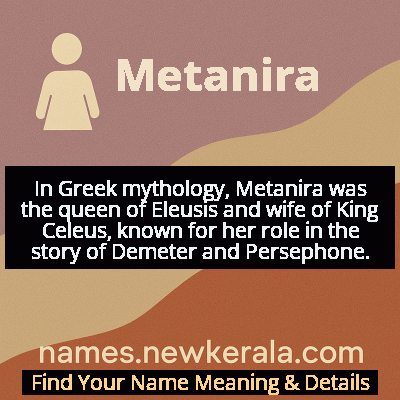Metanira Name Meaning & Details
Origin, Popularity, Numerology Analysis & Name Meaning of Metanira
Discover the origin, meaning, and cultural significance of the name METANIRA. Delve into its historical roots and explore the lasting impact it has had on communities and traditions.
Name
Metanira
Gender
Female
Origin
Greek
Lucky Number
9
Meaning of the Name - Metanira
In Greek mythology, Metanira was the queen of Eleusis and wife of King Celeus, known for her role in the story of Demeter and Persephone.
Metanira - Complete Numerology Analysis
Your Numerology Number
Based on Pythagorean Numerology System
Ruling Planet
Mars
Positive Nature
Generous, passionate, energetic, and humanitarian.
Negative Traits
Impulsive, impatient, moody, and can be overly emotional.
Lucky Colours
Red, maroon, scarlet.
Lucky Days
Tuesday.
Lucky Stones
Red coral, garnet.
Harmony Numbers
1, 2, 3, 6.
Best Suited Professions
Military, sports, philanthropy, leadership roles.
What People Like About You
Courage, energy, leadership, generosity.
Famous People Named Metanira
Metanira of Eleusis
Mythological Queen
Central figure in the Demeter-Persephone myth whose actions led to the establishment of the Eleusinian Mysteries
Metanira (Literary Archetype)
Mythological Character
Represents the archetype of the well-intentioned but interfering mother in classical literature
Metanira (Academic Subject)
Mythological Figure
Subject of numerous scholarly works examining gender roles and mother-child relationships in Greek mythology
Name Variations & International Equivalents
Click on blue names to explore their detailed meanings. Gray names with will be available soon.
Cultural & Historical Significance
Historically, Metanira's narrative has been interpreted through various lenses across different eras. During the Renaissance, she was seen as a cautionary figure about human presumption. In the Victorian era, her story was romanticized as a tale of maternal love. Modern feminist scholarship has reclaimed Metanira as a complex character whose actions, while tragic, stem from authentic maternal concern. Her cultural legacy continues in contemporary discussions about parenting, the boundaries of intervention, and the tension between protective love and allowing natural development. The name Metanira thus carries centuries of cultural interpretation and remains relevant in discussions about human-divine relationships and maternal archetypes.
Extended Personality Analysis
Those bearing the name Metanira are often characterized by a profound sense of responsibility and protective instinct toward those in their care. They typically exhibit strong leadership qualities combined with nurturing tendencies, creating a personality that is both authoritative and compassionate. These individuals tend to be highly observant and intuitive, often anticipating the needs of others before they're expressed. However, this heightened awareness can sometimes lead to over-involvement or the tendency to micromanage situations, reflecting Metanira's mythological impulse to intervene at crucial moments.
The Metanira personality is marked by deep emotional intelligence and a strong connection to tradition and family heritage. They value stability and continuity, often serving as the emotional anchor in their social circles. While they possess natural grace and diplomatic skills, they may struggle with surrendering control and trusting processes to unfold without their guidance. This creates a dynamic personality that grows significantly through life experiences, particularly learning when to act and when to practice restraint. Their journey often involves balancing their protective instincts with the wisdom to allow natural development, making them deeply thoughtful individuals who contribute meaningfully to their communities while continuously evolving in their understanding of relationships and responsibility.
Modern Usage & Popularity
In contemporary naming practices, Metanira remains exceptionally rare, with virtually no recorded usage in birth registries worldwide over the past century. The name's primary modern presence is in academic and literary contexts, where it appears in classical studies, mythological retellings, and historical fiction. Its complexity and association with a tragic narrative make it challenging for everyday use, though it occasionally surfaces in creative writing as a character name that conveys ancient Greek heritage and regal maternal energy. The name's modern appeal lies in its uniqueness and deep mythological roots, attracting parents and writers interested in names that are both distinctive and meaningful. However, its length and unfamiliar pronunciation present practical challenges for regular use. In digital spaces, the name occasionally appears in mythology forums, classical literature discussions, and among communities interested in reviving ancient names, maintaining its status as a scholarly rather than popular choice.
Symbolic & Spiritual Meanings
Metanira embodies rich symbolic meanings that transcend her specific mythological narrative. She represents the universal human experience of good intentions leading to unintended consequences, symbolizing the delicate balance between care and control. Her story serves as an enduring metaphor for the limitations of human understanding when confronted with divine or natural processes beyond comprehension. The name symbolizes the tension between mortal agency and cosmic order, teaching that some transformations require non-interference to reach their full potential.
Agriculturally, Metanira connects to the symbolism of interrupted growth and the cycles of nature, mirroring how her intervention disrupted Demeter's immortalization ritual. This makes her a symbol of both cultivation and its necessary boundaries. Psychologically, she represents the archetype of the protective mother whose love, while genuine, must learn to trust processes larger than herself. The name carries the symbolic weight of hospitality's sacred nature in ancient cultures and the profound consequences that can stem from seemingly small interruptions of sacred rituals. Ultimately, Metanira symbolizes the painful but necessary learning process through which humans discover their proper place in the larger order of things.

